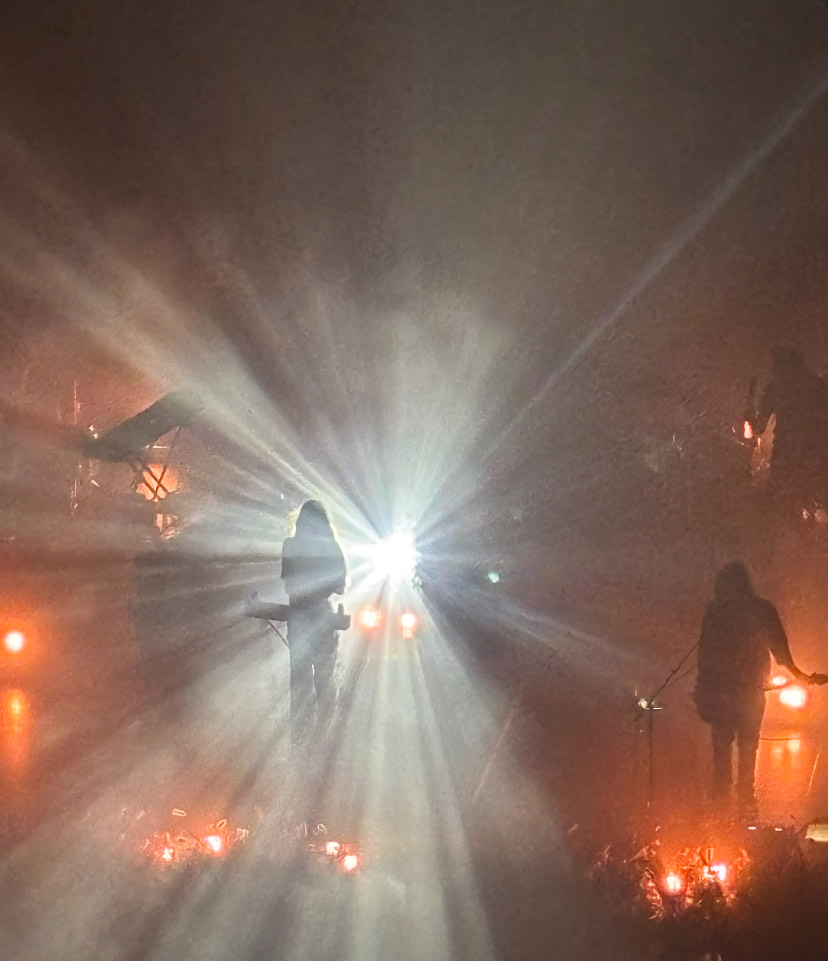As the needle drops and loud crackling filters through the eight speakers in Crawford Hall, those attending Late Night Vinyl’s playing of Saturday Night Fever unlock their phones, open their computers or flip to a new page in a book. Professor Mark Mandarano, orchestrator of the event, sits back down in the center chair of the front row and merely folds his arms.
But it is not long before Mandarano is back on his feet—the record has begun skipping. Seconds-long excerpts of the introduction to the leadoff track, “Stayin’ Alive,” can’t seem to find their way out of the speakers. Mandarano offers an apology, moves the needle farther down the track, and glides back to his chair. He looks straight ahead.
“Stayin’ Alive” continues coming through the speakers in bits in pieces. Mandarano shakes his head each time the record skips, but remains in his chair—until the bridge:
“Life goin’ nowhere / Somebody help me / Somebody help me, yeah / Help me, yeah / Help me, yeah / Help me, yeah / Help me, yeah / Help me, yeah…”
“Now you know where the famous expression came from,” Mandarano deadpans as he gets up to move the needle again.
Side A continues to skip and get stuck intermittently until its final song, “If I Can’t Have You.” Before he flips the record over to Side B, Mandarano shows the LP to the small crowd that braved a downpour to attend the event. Deep gouges scar much of the first side, and they are particularly dense around the edge of the record. Mandarano explains that he brought this copy of Saturday Night Fever back after visiting his sister in New York a few years ago. “Either she really hated this record or she spilled nail polish on it and did a bad job of trying to clean it up,” Mandarano quips.
In some ways, this was an atypical Late Night Vinyl event. A disco record had never been played on the Crawford Hall turntable before October 6, 2016. In addition, at no other Late Night Vinyl session has the sensitive nature of vinyl been such a prominent aspect of the listening experience; Mandarano typically plays his own records, and they are generally very clean. Yet at the same time, diversity of music and the very nature of vinyl records are central to the ethos of Late Night Vinyl.
Mandarano started Late Night Vinyl in the spring of 2013, his second semester at Macalester. Because he rehearses the orchestra in Crawford Hall, he saw the room’s then-newly-added turntable twice a week and noticed that no one was using it.
“At the same time, I was walking around campus, seeing all these people listening to music through earphones, but no two people were listening to the same thing, sharing an experience,” Mandarano says. “And in my conversations with students, [I learned] most don’t listen to albums all the way through; they select certain tracks. So I thought we had to bring back handing your volition over to an artist to hear how they’ve ordered the experience.”
With the tantalizing turntable and Mandarano’s collection of records, listening to albums on vinyl offered the perfect way to bring people together over music. He determined the listening events should be held late at night “when nobody has anything to do,” and in March of 2013, Sgt. Pepper’s Lonely Hearts Club Band by the Beattles, was the first LP played in the Late Night Vinyl series.
Since then, Mandarano has aired a slew of classic albums—Rumours, Hotel California and Graceland, to name a few. And while choosing good music is a primary concern of Mandarano’s, each year he plays albums from a variety of eras and genres made by bands of different nationalities, races and genders.
Aside from exposing Macalester students to a diverse array of records, Late Night Vinyl offers its attendants the opportunity to re-evaluate albums they have listened to before. The superior sound quality of vinyl allows listeners to hear greater detail in music than they are likely accustomed to, and the pops and crackling that are so often an aspect of playing vinyl records add a new dimension to one’s listening experience. Listening to an album on vinyl can even transform one’s opinion of it: “Sitting down, giving [an album] your full attention, and listening to it with a group of other people, where that’s all you’re doing together, can change your perception of any particular record,” Mandarano says.
While Mandarano has often found himself leaving Late Night Vinyl events with a greater appreciation for the craftsmanship of the album played, Saturday Night Fever was not among them. “It’s a little tiring to hear the same really orchestral, really upfront [songs]. This was a little disappointing. There are so many layers in the music at all times that after a while, you’re not really listening to music anymore; it’s just coming as one big sound.”
Yet even though the album may have fallen short of Mandarano’s expectations, the crowd still found listening to Saturday Night Fever a rewarding experience. “I really enjoyed getting exposure to some disco,” says Natanya Schnyer ’20. This writer found himself boogieing to the Bee Gees for hours afterward.
Want to be kept in the loop on the happenings of Late Night Vinyl? Like the event’s dedicated Facebook page, @LateNightVinylatMac.







Penelope Fisher • Sep 10, 2019 at 9:45 pm
certainly like your website however you need to test the spelling on several of your posts. Several of them are rife with spelling problems and I find it very troublesome to inform the reality however I’ll certainly come again again.
Eric Reid • Sep 8, 2019 at 12:22 pm
Thanks for your write-up. One other thing is that individual states have their particular laws that will affect people, which makes it very, very hard for the the legislature to come up with a new set of rules concerning home foreclosure on house owners. The problem is that every state has own laws and regulations which may work in an adverse manner when it comes to foreclosure policies.